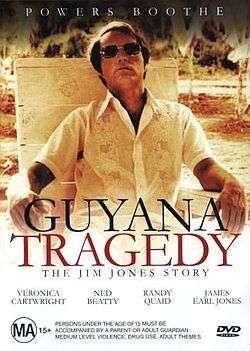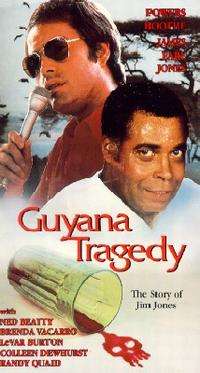Guyana Tragedy: The Story of Jim Jones
| Guyana Tragedy | |
|---|---|
 Australian DVD cover | |
| Genre |
Biography Drama |
| Directed by | William A. Graham |
| Starring |
Powers Boothe Ned Beatty LeVar Burton Colleen Dewhurst Randy Quaid Veronica Cartwright James Earl Jones |
| Composer(s) | Elmer Bernstein |
| Country of origin | United States |
| Original language(s) | English |
| Production | |
| Executive producer(s) | Frank Konigsberg |
| Producer(s) |
Sam Manners Ernest Tidyman |
| Cinematography | Gil Hubbs |
| Editor(s) |
Tony de Zarraga Aaron Stell |
| Running time | 192 minutes |
| Production company(s) | Konigsberg Company |
| Distributor | CBS |
| Release | |
| Original network | CBS |
| Original release |
|
Guyana Tragedy: The Story of Jim Jones, also called The Mad Messiah,[1] is a 1980 television miniseries about the Peoples Temple led by Jim Jones, and their 1978 mass suicide at Jonestown. Based on the book by Charles A. Krause, entitled Guyana Massacre: The Eyewitness Account, the film was originally shown on television on April 15, 1980.
Synopsis
The film draws on Guyana Massacre: The Eyewitness Account and reports from The Washington Post at the time, to describe the life of Jim Jones from a 1960s idealist to the November 1978 mass murder/suicide of members of Peoples Temple in Jonestown, Guyana.[2] In the beginning of the film, Jim Jones is seen helping minorities and working against racism. Later, after a move to San Francisco and increased power and attention, Jones becomes focused on his belief in nuclear holocaust, and moves hundreds of his followers to Guyana. Congressman Leo J. Ryan is notified that some individuals are being held against their will, and after going to investigate, the Guyana tragedy itself is depicted.[3]
Cast
| Actor | Role |
|---|---|
| Powers Boothe | Jim Jones |
| Ned Beatty | Congressman Leo J. Ryan |
| James Earl Jones | Father Divine |
| Randy Quaid | Clayton Richie based on Timothy Stoen |
| Meg Foster | Jean Richie |
| Linda Haynes | Karen Bundy |
| Brad Dourif | David Langtree based on Larry Schacht |
| LeVar Burton | Richard Jefferson |
| Michael C. Gwynne | Larry King |
| Veronica Cartwright | Marceline Jones |
| Albert Hall | Otis Jefferson |
| Diane Ladd | Lynette Jones |
| Diana Scarwid | Sheila Langtree |
| Colleen Dewhurst | Mrs. Myrtle Kennedy |
| Irene Cara | Alice Jefferson |
| Rosalind Cash | Jenny Hammond |
| Ron O'Neal | Col. Robles |
| Brenda Vaccaro | Jane Briggs |
| Joel Godard | John Briggs |
| Clifton James | Barber Charlie Amos |
| Ed Lauter | Jim Jones Sr. |
Characters
Jones's family members in the movie are based directly on his own family. The characters of Clayton and Jean Richie are based on Timothy and Grace Stoen (he was a primary Temple attorney and Jones's former right-hand man, she a main organizer for the Temple's "Planning Commission"), and David Langtree on Larry Schacht (the sole doctor at Jonestown), though elements of other Temple members are added to each, and details are changed. Many of the other characters are composites of one or more persons.
Production
Though not a documentary in its own right, the film takes the style of a "true life" portrayal of the events.[4] James Earl Jones appears in the film, as spiritual leader Father Divine. The final scenes of the film, with dialog taken from the infamous "Jonestown death tape" (FBI Number Q 042), were produced in a documentary cinematic style, and shot in Puerto Rico and Georgia instead of Guyana. The film was originally broadcast in two parts by CBS Television, on April 15 and 16.[2]
Reception and awards

A 1980 Time magazine review was mostly positive, but criticized the film for spending too much time on earlier parts of Jones' life, stating: "There really is no point in recounting the minutiae of a madman's life if, after four hours, it is still impossible to understand how Jones became a sex-and-drug-crazed megalomaniac or why his misfit followers so easily accepted his larcenous and sadistic behavior."[5] The Time review went on to also note the way Boothe captured the minutiae of the Jim Jones character, and lamented that the film's writer had not made the role more complex for Boothe to portray.[5]
Actor Powers Boothe, who played the role of Jim Jones, won the 1980 Emmy Award for Outstanding Lead Actor in a Limited Series or a Special for his portrayal in the film.[6][7] Boothe was the only nominated actor in any category to attend the awards ceremony, since the Screen Actors Guild was boycotting the event during a strike.[8] The film was also nominated for Emmy Awards in three other categories, including Outstanding Achievement in Film Sound Mixing, Outstanding Directing in a Limited Series or a Special, and Outstanding Drama or Comedy Special. The film was also nominated for an Eddie Award, for Best Edited Episode from a Television Mini-Series, by the American Cinema Editors.[9]
References
- ↑ Hedblad, Alan (2000). Something About the Author. Gale. pp. Page 95. ISBN 0-7876-4031-X.
- 1 2 Erickson, Hal., Plot Synopsis, Guyana Tragedy: The Story of Jim Jones, Allmovie, retrieved June 10, 2007.
- ↑ Scarecrow Video (2004). The Scarecrow Video Movie Guide. Sasquatch Books. pp. Page 467. ISBN 1-57061-415-6.
- ↑ Yearbook of the Encyclopedia Americana (1981). The Americana Annual: An Encyclopedia of Current Events. Grolier. pp. Page 521.
- 1 2 Rich, Frank (April 14, 1980). "Ratings Gambit: GUYANA TRAGEDY: THE STORY OF JIM JONES". Time Magazine. Time Warner.
- ↑ Lundius, Jan; Mats Lundahl (1999). Peasants and Religion. Routledge. pp. Page 311. ISBN 0-415-17411-2.
- ↑ Franks, Don (1996). Entertainment Awards: A Music, Cinema, Theatre and Broadcasting Reference, 1928 Through 1993. McFarland & Co Inc Pub. pp. Page 56.
- ↑ Trivia for The 32nd Annual Primetime Emmy Awards, Internet Movie Database, Amazon.com. Retrieved June 14, 2007.
- ↑ Awards for Guyana Tragedy: The Story of Jim Jones, Internet Movie Database, Amazon.com. Retrieved June 10, 2007.
External links
- Guyana Tragedy: The Story of Jim Jones at the Internet Movie Database
- Guyana Tragedy at AllMovie
- Guyana Tragedy, Yahoo! Movies
- Overview page, Rotten Tomatoes